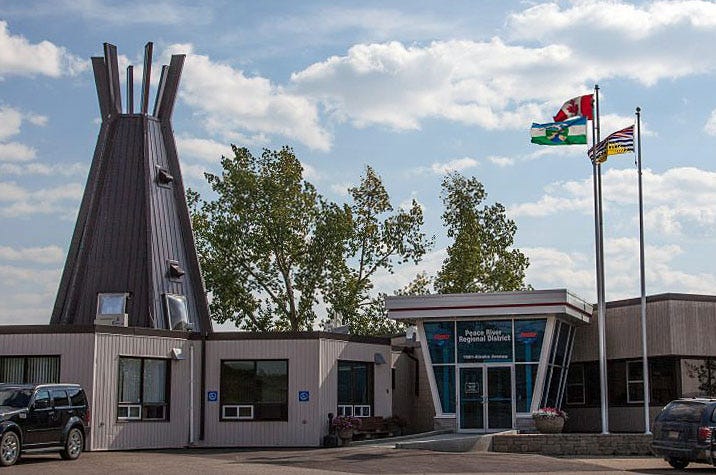PRRD asks First Nations to back EA concerns
Peace River Regional District board hopes local First Nations will consider joining their voice to that of the board, in its objection to the provincial government’s decision to waive the need for Environmental Assessments for wind farms.
Because First Nations are stewards of the land who are consistently in favour of protecting and preserving the environment, as well as majority owners in the two wind projects approved for the Peace region, the board is hopeful that local Nations will support its request.
When the call for power was first put out, the regional district sent the government a letter in July 2024, seeking a cumulative impacts assessment for any projects that might be approved for the Peace region.
In a September 2024 letter to the Regional District, the then-minister of Energy, Mines and Low-Carbon Innovation, Josie Osborne assured the board that:
“Clean energy projects in British Columbia, including wind farms, are subject to rigorous permitting requirements under BC’s Environmental Assessment Act. Under the Act, projects that trigger a review undergo an environmental assessment to ensure that potential environmental, economic and social effects, including cumulative effects are thoroughly reviewed prior to approval.”
And that “As the EA process provides opportunities for the public and local governments to provide input on all reviewable projects, I encourage you to participate in these processes to ensure your views on the economic effects of a project are accurately reflected in the assessment."
By doing away with the requirement for an EA, not only is the Regional District and other regions where wind farm projects have been announced denied any assessment of cumulative impacts, but they are denied any say in the projects.
Director Travous Quibell, Mayor of Hudson’s Hope has experience with the repercussions of large projects and has deep concerns that by throwing out the EA process, the people will lose their voice.
“The EA process is one of the few places we have left where we can tie conditions to a project,” Quibell said. Without EA, there are very few opportunities for feedback.
“To take away the EA process in it’s entirety and not give us that avenue to have a voice, it’s the province’s responsibility to make sure that process is protected and enshrined so that everyone gets a say, so that we’re protected,” he said.
Quibell added that he has a “huge issue with not having the environmental assessment process be tied to any large project.”
These two wind farms are large projects, with the Taylor Wind project alone consisting of 40 wind turbines, a substation, a high-voltage transmission line and other infrastructure to produce 200 MW of power.
Board chair and Area D director, Leonard Hiebert noted that when PRRD directors had a meeting with the new energy minister, Adrian Dix at the recent Natural Resources Forum in Prince George, they mentioned Osborne’s letter, and Dix’s response was less than reassuring.
Hiebert said that Dix’s comment was “I’m the minister to make a decision.”
“It basically told me no matter what we say or do, he’s gonna do what he wants anyway. But that doesn’t mean we can’t keep fighting to make sure we get that back, because we can’t let up on it now,” Hiebert said.
“They knew our concerns before going in, and they didn’t come back to talk to us to clarify those concerns. They said all your concerns would be taken care of by the EA process, and now here we are. They pulled it.
“That’s the concern.”
The Committee of the Whole recommended that the Board send a letter to Premier Eby and the BC Legislature, opposing any removal of the EA process on wind farms and reaffirming the previous three recommendations that were sent to the province in July 2024.
Pouce Coupe Director and Mayor Danielle Veach recommended that the Board also write a letter to all seven First Nations neighbours, “highlighting our concerns regarding these environmental impact studies as well as the cumulative effects” and invite them to share any concerns they have, with the PRRD and the province.
“This is an issue that this board is extremely concerned about,” Veach said. “We’ve already met with the minister; we saw how well that went.
“It’s about having a conversation. It’s about having a united front. It’s about working together. It’s about all the things we talk about all the time.”



